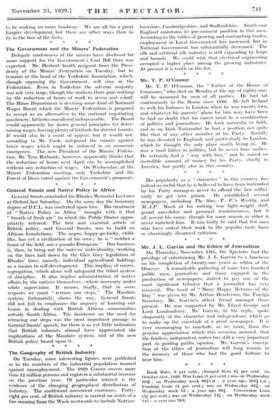General Smuts and Native Policy in Africa General Smuts concluded
his Rhodes Memorial Lectures at Oxford last Saturday. On the same day the honorary degree of D.C.L. was conferred upon him. His treatment of " Native Policy in Africa brought with it that " breath of fresh air " to which the Public Orator appro- priately referred. The first and essential article of British policy, said General Smuts, was to build on African foundations. The negro, happy-go-lucky, child- like, has yet a civilization of his own ; he is " neither a beast of the field, nor a pseudo-European." Our business is, then, to bring out the natives' individuality, working on the lines laid down by the Glen Grey legislation of Rhodes' time, namely, individual agricultural holdings as a means to self-development. This implies, of course, segregation, which alone will safeguard the tribal system of discipline. It also implies administration of native affairs by the natives themselves—where necessary under white supervision It means, finally, that in some respects we • must " retrace our steps." The Mandate system, fortunately, shows the way. General Smuts did not fail to emphasize the urgency of learning our lesson in dealing with British African communities outside South Africa. The insistence on the need for retracing- our steps was the most important passage in General Smuts' speech, for there is as yet little indication that British colonists abroad have appreciated the implications of the Mandate system, and of the new British policy based upon it.
* * * *






























































 Previous page
Previous page